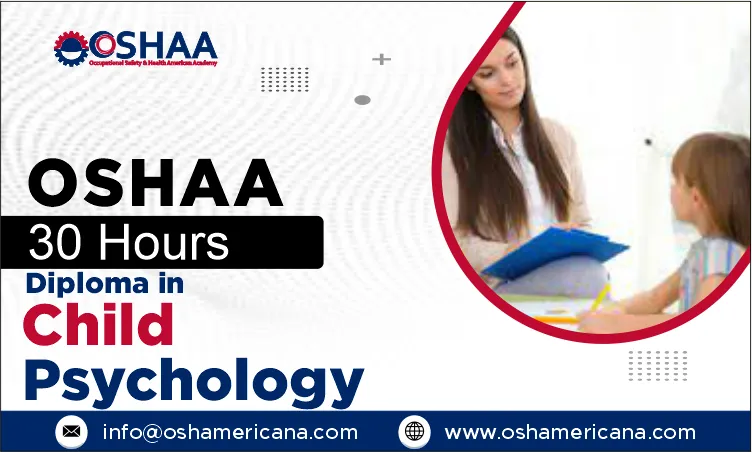Understanding child psychology is essential for anyone working with children, from parents and educators to healthcare professionals. The OSHAA 30-Hours Diploma in Child Psychology provides an in-depth understanding of children’s cognitive, emotional, and social development. This course equips participants with the skills to support children’s mental well-being, identify developmental concerns, and create a nurturing environment for healthy growth.
Child psychology focuses on the behavioural, emotional, and cognitive development of children from infancy to adolescence. It explores how genetics, environment, parenting styles, and social interactions shape a child’s personality, learning abilities, and emotional responses. Understanding these aspects helps professionals and caregivers provide appropriate support and guidance at different developmental stages.
The OSHAA 30-Hours Diploma in Child Psychology is designed to provide foundational knowledge in child development and psychological principles. The course covers key topics such as developmental milestones, emotional regulation, social influences, and psychological disorders in children. Participants will also explore the impact of trauma, behaviour management strategies, and the role of caregivers in fostering positive mental health.
The OSHAA 30-Hours Diploma in Child Psychology is an essential course for anyone working with children or interested in understanding child development. Whether you are a parent, teacher, or aspiring psychologist, this course provides the knowledge and skills needed to support children’s mental health, behaviour, and overall well-being. By gaining expertise in child psychology, you can contribute to creating a positive and nurturing environment that helps children thrive.
OSHAA 30-Hours Diploma in Child Psychology
Study Units
Learning Outcomes
Introduction to Child Psychology (3 Hours)
- Understand the fundamental principles of child psychology.
- Explore key psychological theories related to child development.
- Recognise the importance of early psychological development in shaping future well-being.
Developmental Stages and Milestones (4 Hours)
- Identify major cognitive, emotional, and social developmental milestones from infancy to adolescence.
- Understand typical and atypical patterns of development.
- Learn how to support children in different stages of growth.
The Role of Family and Environment in Child Development (4 Hours)
- Analyse the impact of parenting styles, family dynamics, and cultural influences on child development.
- Understand how environmental factors shape a child’s psychological well-being.
- Recognise the role of caregivers and educators in fostering positive development.
Emotional and Social Development in Children (4 Hours)
- Understand the formation of attachment, self-identity, and emotional regulation in children.
- Explore the role of peer relationships and social interactions in childhood.
- Learn strategies to support children’s emotional intelligence and social skills.
Common Psychological Disorders in Children (4 Hours)
- Identify symptoms and causes of common psychological disorders such as ADHD, anxiety, depression, and autism spectrum disorder.
- Understand diagnostic criteria and challenges in recognising mental health issues in children.
- Learn about available treatments and support systems for children with psychological disorders.
Behavioural Issues and Management Strategies (4 Hours)
- Recognise common behavioural challenges in children, including aggression, defiance, and hyperactivity.
- Explore behaviour management techniques such as positive reinforcement and structured interventions.
- Learn how to apply effective discipline strategies while fostering emotional well-being.
Impact of Trauma and Stress on Child Development (3 Hours)
- Understand the effects of trauma, neglect, and stress on a child’s psychological and emotional health.
- Identify signs of trauma and stress in children.
- Learn strategies for providing emotional support and resilience-building techniques.
Psychological Assessment and Intervention Techniques (4 Hours)
- Gain insight into psychological assessments used to evaluate child development and mental health.
- Learn about intervention techniques such as counselling, play therapy, and cognitive-behavioural strategies.
- Understand the role of multidisciplinary teams in supporting children’s psychological well-being.
- Comprehensive Understanding of Child Development – Gain in-depth knowledge of cognitive, emotional, and social development in children.
- Early Identification of Developmental and Psychological Issues – Learn how to recognise early warning signs of mental health concerns and behavioural challenges.
- Practical Behaviour Management Techniques – Develop skills to manage and support children’s behaviour effectively.
- Enhanced Career Prospects – Beneficial for professionals in education, healthcare, social work, and childcare.
- Stronger Communication with Children and Families – Learn how to effectively engage with children and guide parents in supporting their child’s mental well-being.
- Application of Psychological Theories in Real-Life Settings – Understand and apply psychological principles in schools, homes, and clinical environments.
- Improved Support for Children with Special Needs – Gain insights into working with children with ADHD, autism, and other developmental disorders.
- Increased Confidence in Working with Children – Develop practical skills to foster positive emotional and psychological growth in children.
- Knowledge of Trauma and Stress Management – Learn how to support children who have experienced adverse childhood experiences.
- Understanding of Psychological Assessments and Interventions – Gain familiarity with tools and techniques used in child psychology to assess and support children’s well-being.
The OSHAA 30-Hours Diploma in Child Psychology is designed for individuals who work with or support children, including:
- Teachers and Educators – To better understand student behaviour, learning difficulties, and emotional well-being.
- Parents and Guardians – To gain insights into their child’s psychological development and learn effective parenting strategies.
- Childcare Professionals – Including nursery staff, nannies, and babysitters who play a key role in early childhood development.
- Social Workers and Counsellors – To support children experiencing emotional, behavioural, and psychological challenges.
- Healthcare Professionals – Such as paediatric nurses, occupational therapists, and child psychologists involved in child development and mental health.
- Special Education Needs (SEN) Specialists – To provide tailored support for children with ADHD, autism, and other developmental disorders.
- Youth Workers and Community Support Staff – To assist children and families in overcoming social and emotional difficulties.
- Students and Aspiring Child Psychologists – As a foundational step towards further studies and careers in psychology, education, or child welfare.
This course is ideal for both professionals and individuals seeking to expand their knowledge of child psychology and contribute to the well-being and healthy development of children.







